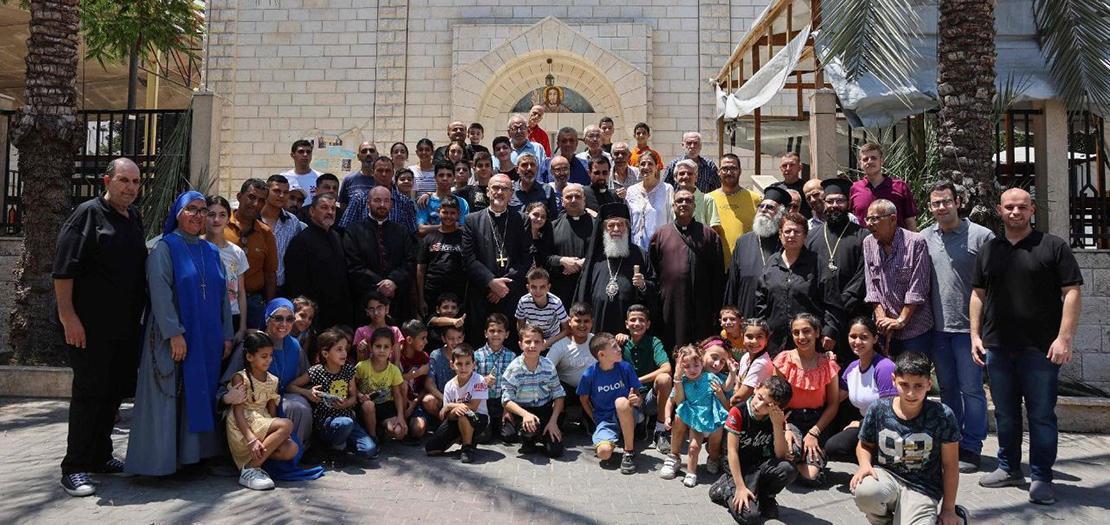Issued by the Catholic Center for Studies and Media - Jordan. Editor-in-chief Fr. Rif'at Bader - موقع أبونا abouna.org
O Christians of Gaza, may the most noble peace be upon you
Since October 7, which not only plunged Gaza and Palestine into a cycle of violence and persecution, but rather engulfed the entire world at time when the Christians, who are few in number in Gaza, found themselves jointly sharing the prevailing status, namely the destiny and the future. They, consequently, sought refuge in their church which protected them over the past centuries.
The Christians were divided into two groups sheltering in two churches, namely the Church of the Holy Family, which is affiliated with the Latin Patriarchate of Jerusalem, and the Church of Saint Porphyrius, which is affiliated with the Greek Orthodox Patriarchate of Jerusalem, where they used to pray of daily bases. When Saint Porphyrius had earlier been bombed leading to the martyrdom of several believers, several families headed to the Church of the Holy Family, which emerged as a parish in 1890, and was built by Jordanian priest Hanna Al-Nimri in 1969.
In addition to the daily work of the priests, Sisters of Mother Teresa Congregation give shelter to the elderly, the sick, and those with special needs. After their home was bombed as well, the nuns moved to the church. As for the Rosary Sisters, who oversee one of the most important schools in the Gaza Strip, the school was destroyed, and the congregation sisters sought to temporarily leave Gaza, while the Sisters of the Incarnate Word remained in the church.
At an earlier time, a blatant attack took place before the entire world on the Church of the Holy Family causing the death of three people and the wounding of several others, including the church's pastor, Fr. Gabriel Romanelli. This Argentinian priest had arrived in the East, particularly in Jordan in 1997, where he stayed for several years, then moved to Palestine. Pope Francis used to call him daily along with Fr. Yousef As’ad, who was the lone priest at the outset of the Israeli aggression. Fr. Gabriel joined him later, based on the fact that it was difficult for him to come to Gaza, as he was in Rome at the start of the aggression, and it was difficult for him to proceed to the besieged Gaza Strip. Then, Father Carlos--the regional superior of the congregation--went there in an expression of support.
The view of the revered priests checking the wounded is an impression of the righteous and pious shepherds who remain steadfast with their people, serving them as brothers, companions, and friends throughout the almost two-year-long aggression.
The targeting of a church, with its pious worshippers, including the elderly and children, is absolutely an unacceptable act. It was denounced by various religious and political circles. Pope Leo XIV had expressed his regret and sorrow, while calling for an immediate ceasefire and launching negotiations that would lead to justice and peace. Cardinal Pierbattista Pizzaballa, Latin patriarch of Jerusalem, visited Gaza twice last year, and visited it again the day before yesterday, accompanied by Greek Orthodox Patriarch Theophilos III. They lit candles in memory of the martyrs, and visited the wounded in their recovery beds during which they expressed their unlimited solidarity with the people, not only with Christians but also with Muslims.
Jordan was among the earliest countries to condemn this aggression on the church, since it constitutes an attack on all components of the Palestinian people, including the entirely afflicted Gaza Strip.
While we stress that ‘there is no power nor strength other that by God’, we hope that this savagery perpetrated by the occupying forces against all the components of the Palestinian people and all their holy sites will come to an end. A few days ago, the world witnessed an attack by extremist settlers on the town of Taybeh, near Ramallah, a town where there are several churches. The historic Church of St. George (Al-Khader Church) and the Christian cemetery were set ablaze. Church leaders visited Taybeh and conveyed the greetings of all believers to the people of this ancient town. A letter sent by His Majesty King Abdullah II conveying solidarity with the town residents and with all sectors of the Palestinian people was also read out.
From Taybeh to Gaza, with a distance of about 100 kilometers, people in all the cities and villages of historic Palestine share the same suffering, even with greater economic pressure. This is attributed to the fact that everything is interconnected, and that the hard political situation impacts every aspect of the dilapidated economy of the people.
We plead with God to send high-minded people who are serious about pursuing peace, not verbally but rather in reality. Will the blood that has been shed in the Church, and merged with the blood of the entire people serve as a fervent prayer that the Lord would answer in due time to grant tranquility, justice, and peace to His people?
O Lord of peace, rain down peace on us!







